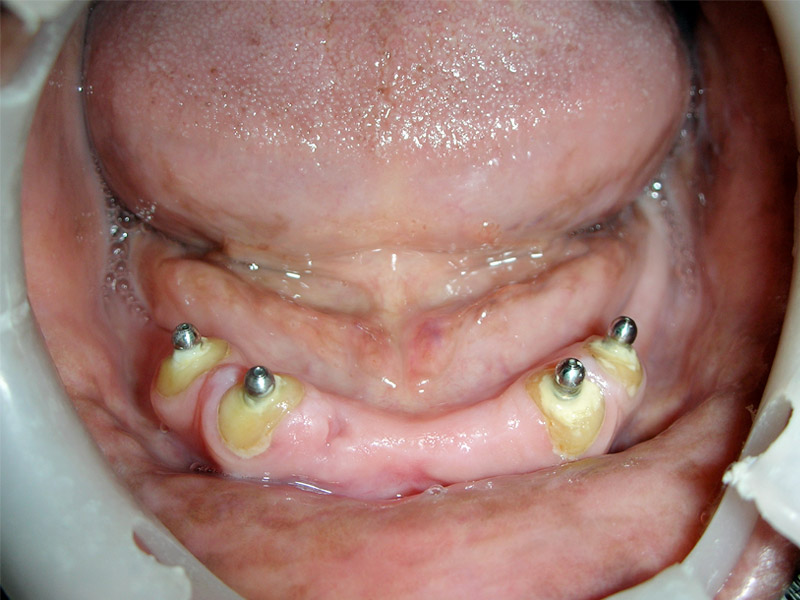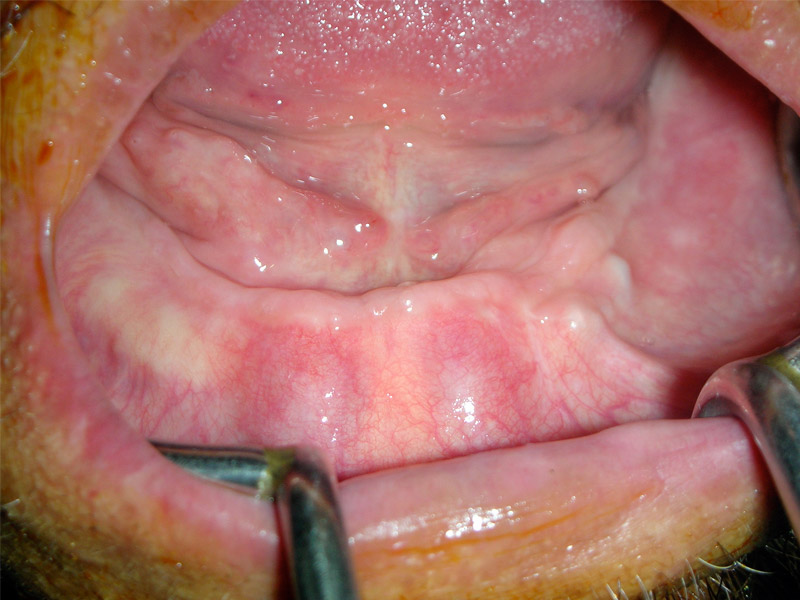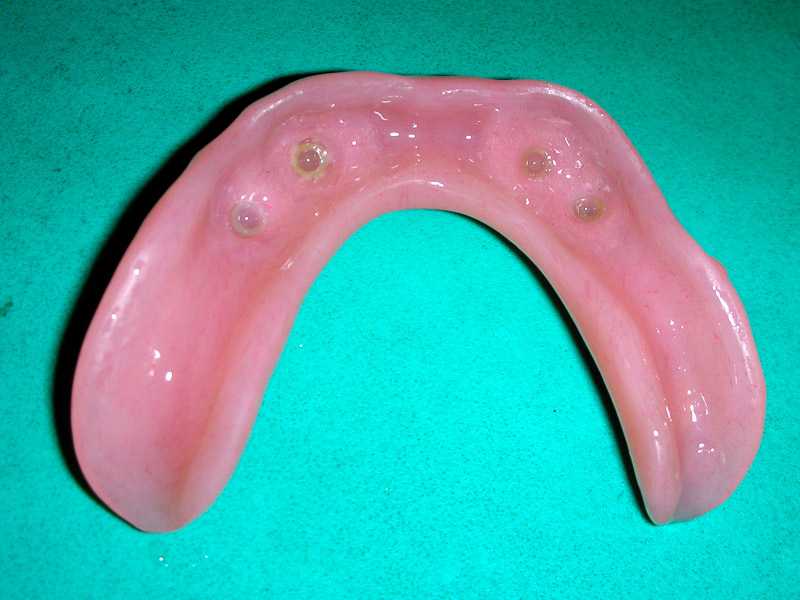Who needs a denture?
Candidates for complete dentures have lost most or all of their teeth. A partial denture is suitable for those who have some natural teeth remaining. A denture improves chewing ability and speech, and provides support for facial muscles. It will greatly enhance the facial appearance and smile.
How do you care for a denture?
A denture is fragile, so it is important to handle with care. Remove and brush the denture daily, preferably with a brush designed specifically for cleaning dentures, using either a denture cleaner or regular soap and water. Never use harsh, abrasive cleaners, including abrasive toothpaste's, because they may scratch the surface of the denture. Don't sterilize the denture with boiling water or place it the dishwasher because it will cause it to become warped. If you wear a partial denture be sure to remove it before brushing your natural teeth.
When not in use, soak it in a cleaner solution or in water. Get in the habit of keeping the denture in the same safe and handy place to reduce the likelihood of misplacement.
Dentures Jalandhar,Dentures Treatment Centre,Dentures Treatment Clinic,Dentures Treatment Clinic & Centre Jalandhar in Punjab
Should a denture be worn at night?
While you may be advised to wear your new denture almost constantly during the first two weeks even while you sleep-under normal circumstances it is considered best to remove it at night. Research has shown that removing the denture for at least eight hours during the day or night allows gum tissue to rest and allows normal stimulation and cleansing by the tongue and saliva. This promotes better long term health of gums.
Follow up Denture Care
It is important to continue having regular dental checkups so that we can examine your oral tissues for signs of disease or cancer. As you age, your mouth will continue to change as the bone under the denture shrinks or recedes. To maintain a proper fit over time, it may be necessary to adjust your denture or possibly remake your denture. Never attempt to adjust a denture yourself and do not use denture adhesives for a prolonged period because it can contribute to bone loss. When in doubt, give us a call.
What's the difference between conventional dentures and immediate dentures?
Complete dentures are called "conventional" or "immediate" according to when they are made and when they are inserted into the mouth. Conventional dentures are made and inserted after the remaining teeth are removed and the tissues have healed. Healing may take several months.
Immediate dentures are inserted immediately after the removal of the remaining teeth. To make this possible, the dentist takes measurements and makes the models of the patient's jaws during a preliminary visit.
An advantage of immediate dentures is that the wearer does not have to be without teeth during the healing period. However, bones and gums can shrink over time, especially during the period of healing in the first six months after the removal of teeth. When gums shrink, immediate dentures may require rebasing or relining to fit properly.
What is an overdenture?
An overdenture is one that fits over a small number of remaining natural teeth that have been prepared by the dentist. The prepared teeth provide stability and support for the denture. We can determine if an overdenture would be suitable for you when we examine your mouth and remaining teeth.
What will dentures feel like?
New dentures may feel awkward for a few weeks until you become accustomed to them. The dentures may feel loose while the muscles of your cheek and tongue learn to keep them in place.
It is not unusual to experience minor irritation or soreness. You may find that saliva flow temporarily increases. As your mouth becomes accustomed to the dentures, these problems should diminish. One or more follow-up appointments are generally needed after a denture is inserted. If any problem persists, particularly irritation or soreness, be sure to call.
Will dentures make me look different?
Dentures can be made to closely resemble your natural teeth so that little change in appearance will be noticeable. Dentures may even improve the look of your smile and help fill out the appearance of your face and profile.
Will I be able to eat with my dentures?
Eating will take a little practice. Start with soft foods cut into small pieces. Chew slowly using both sides of your mouth at the same time to prevent the dentures from tipping. As you become accustomed to chewing, add other foods until you return to your normal diet.
Continue to chew food using both sides of the mouth at the same time. Be cautious with hot or hard foods and sharp-edged bones or shells.
Will dentures change how I speak?
Pronouncing certain words may require practice. Reading out loud and repeating troublesome words will help. If your dentures "click" while you're talking, speak more slowly.
You may find that your dentures occasionally slip when you laugh, cough or smile. Reposition the dentures by gently biting down and swallowing.
How long should I wear my dentures?
We will provide instructions about how long dentures should be kept in place. During the first few days, you may be advised to wear them most of the time, including while you sleep. After the initial adjustment period, you may be instructed to remove the dentures before going to bed. This allows gum tissues to rest and promotes oral health. Generally, it is not desirable that the tissues be constantly covered by denture material.
Should I use a denture adhesive?
Dentures are made to fit precisely and usually do not require use of an adhesive for comfort. In an emergency, denture adhesives can be used to keep the dentures stable until you see the dentist, but prolonged use can mask infections and cause bone loss in the jaw. Likewise, a poorly-fitting denture, which causes constant irritation over a long period, may contribute to the development of sores. If your dentures begin to feel loose, or cause pronounced discomfort, see your dentist immediately.
How do I take care of my dentures?
Dentures are very delicate and may break if dropped even a few inches. Stand over a folded towel or a basin of water when handling dentures. When you are not wearing them, store your dentures away from children and pets.
Like natural teeth, dentures must be brushed daily to remove food deposits and plaque. Brushing helps prevent dentures from becoming permanently stained and helps your mouth stay healthy. It's best to use a brush designed for cleaning dentures. A toothbrush with soft bristles can also be used. Avoid using hard-bristled brushes that can damage dentures.
Some denture wearers use hand soap or mild dishwashing liquid, which are both acceptable for cleaning dentures. Avoid using other powdered household cleansers, which may be too abrasive.
The first step in cleaning dentures is to rinse away loose food particles thoroughly. Moisten the brush and apply denture cleanser. Brush every surface, scrubbing gently to avoid damage.
Dentures may lose their shape if they are allowed to dry out. When they are not worn, dentures should be placed in a denture cleanser soaking solution or in water. Never place dentures in hot water, which could cause them to warp.
Ultrasonic cleaners are also used to care for dentures. However, using an ultrasonic cleaner does not replace a thorough daily brushing.
Disable Preloader




